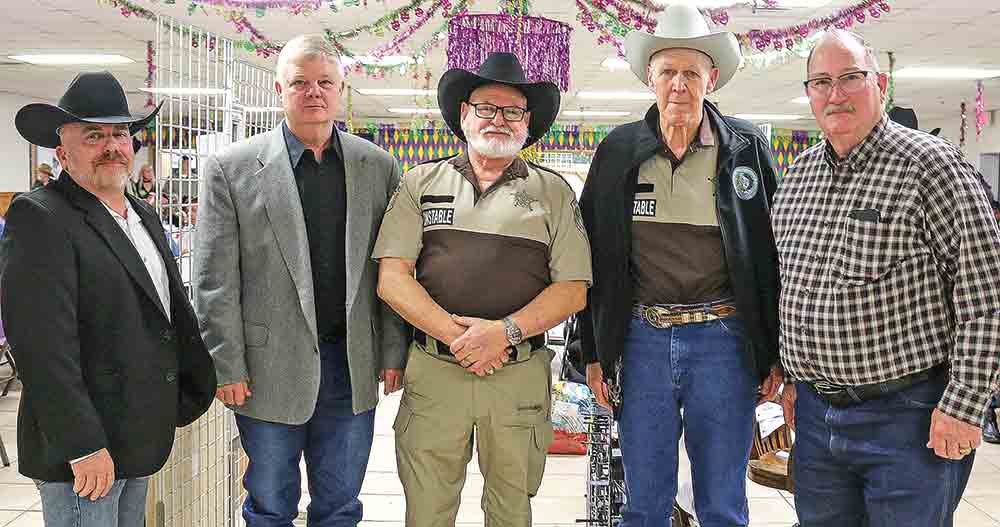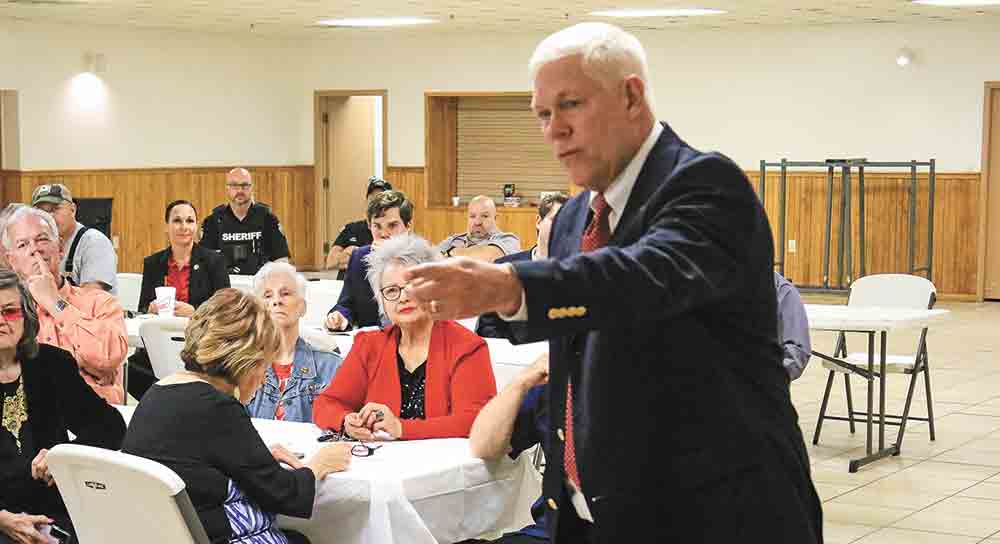 Write a comment
Write a comment
 Every weekend just keeps getting better and better. Feb. 10 was the Boys and Girls Club of Trinity’s Valentine Dinner and Dance. It was a beautiful affair decorated by Ambria Hargrave Dagle and Jason Jordan. Hearts, fresh flowers, and candlelight was the theme for the evening along with music provided by Danny Cleveland.
Every weekend just keeps getting better and better. Feb. 10 was the Boys and Girls Club of Trinity’s Valentine Dinner and Dance. It was a beautiful affair decorated by Ambria Hargrave Dagle and Jason Jordan. Hearts, fresh flowers, and candlelight was the theme for the evening along with music provided by Danny Cleveland.
I do not know the amount that this fundraiser made at this time, but I will let you know how successful if was next week. People were beautiful in their attire, the food was outstanding, and a fun time was had by all.
T.J. Allbright and his crew had the most wonderful steaks prepared for the guests, and Matt Warren, who is one of the best chefs in the county, had asparagus, twice-baked potatoes, and shrimp salad ready for 200 people to partake of in perfect timing. Four hours of fun and camaraderie was the order of the evening. Thank you, Trinity, for your continued support for this organization’s community youth.
•By the time you read this article, Valentine’s Day will be over, but not forgotten. The dedicated staff at Martin Senior Citizen Center also decorated and hosted the most wonderful Sweetheart Luncheon you would ever want to eat, and I cannot wait to see the pictures of this event on face book.
Another event that was a huge success was the father/daughter dance at Lansbury Elementary School hosted by the Senior Class Prom Committee and their sponsor, Kim Holmes. They raised $2,400 for the prom students and their dates to be held in the spring. Donations are welcomed by everyone for this student activity.
•Here is a list of events for the Veterans of Trinity for the rest of February and one in March. Trinity VFW Post 6899 is located at 400 Caroline St., and the “Cantina” is open daily from 4-10 p.m. except for each Tuesday of the month.
On Feb. 18 there was a “free” breakfast for Veterans from 8-10 a.m. at the VFW Hall. Families and friends can eat, but donations are accepted and appreciated. This is a monthly event. Veterans are also served dinner once a month.
On Saturday, a Mardi Gras Party will be held from noon to midnight with door prizes, a 50/50 raffle and food available for $10 a plate. It’s BYOB, and they will be serving Louisiana Gumbo with meal.
On March 18, along with the free monthly Veterans breakfast, the VFW Post will sponsor a blood drive from 10 a.m. until 3 p.m. Free snacks and a gift card will be available to veterans.
Daily meals are available for $5 every day except Tuesday. Kitchen opens from 5-8:30 p.m.
•We are almost through February, and Easter is on the way. I listed some of the special days associated with this religious holiday last week, and I am always amused by the funny names attached to this event.
For instance, Fat Tuesday. Is there a skinny Tuesday? Ash Wednesday. Is there a pine Wednesday? Good Friday, is there a bad Friday? Also, Easter Sunday is the only holiday that always falls on Sunday. All the other holidays fall on Monday or the day of the week each one lands on in that month. However, you can always count on Thanksgiving Day to fall on the fourth Thursday of November of every year.
•March 17 is St. Patrick’s Day, and the Groveton County Fair starts with activities and awards culminating on March 18 in the evening with the livestock sales held that day also.
•I received the Knights of Columbus Fish Fries starting at the End of February following Ash Wednesday, which is Wednesday.
The first Lenten Fish fry is scheduled for Friday, and the last scheduled Fish Fry is March 31. Each Fish Fry starts at 5 p.m. and ends at 7 p.m. and is held in the Most Holy Trinity Catholic Church fellowship hall on Highway 19 North in Trinity.
You may dine in or take out. The public is invited to attend, and the adult plate is $12 and the children’s plates are $5. the Knights of Columbus sponsor these Fish Fries and they benefit the Trinity High School Seniors and other charities. For more information call the church at (936) 594-6664.
•The Trinity Good Samaritan House Inc., located off Elm Street, is open on Wednesday and Thursday each week from 9 a.m.-noon and provides clothes, food, and medicine to families in need through this facility, or by making donations to other facilities that help Trinity citizens in need.
In December, this charitable organization sent 25 bags and containers of items to Kentucky to the victims of the latest winter tornados. Also in December, The Good Samaritan House donated $1,000 to Loaves and Fishes (a Food Pantry), and donated $1,000 to Martin Senior Citizen Center for the daily meal delivery for 61 elderly or handicapped shut-ins in our community.
GSH donated 100 tiny baby clothes to the Trinity Tabernacle Church to help needy new mothers, and the Good Samaritan House during the year 2022, gave 786 clothing items to 56 adults, and 16 children as well as contributing $2,000 to the Christmas Basket Program of Trinity. Steve Richardson, and Nellie Mosher do an outstanding job operating this facility. Please tell them thank you whenever you can. They deserve a pat on the back for their continued hard work, and they and their staff are some of the Community’s best volunteer care givers in our Trinity County.
•TISD has another holiday for the students in February on Monday, and the TISD teachers have a staff development day on that Monday also.
•On March 1, the Trinity Lions Club will meet Wednesday at noon at the Trinity Peninsula Chamber of Commerce Building on Stadium Street. The public is invited to attend.
Last week the Texas Lions Club Hall of Fame Governor Bubba Hirsch attended our meeting, and we had the Mayor of Trinity, Billy Goodin, speak about the progress of his first term. Watch this space for our next speaker.
Basketball, soccer and extracurricular activities abound on the Trinity High School campus. A career day was held, and several fundraisers will take place this month for student projects, clubs, and awards programs. The prom is coming up shortly and “Princess Project” makes dresses available for girls who need financial help with their attire for this event. For more information about “Princess Project” call Karen Dixon at (936) 581-6531.
•I ate barbecue Saturday at the Old Timers Stand in front of the Old Alco Store. It sure was good. I was unhappy because I went back to get their Jalapeno Pepper Poppers and they were sold out. Phooey. Next time I will order more of them first. See you at the center.
 Constables attending include Brian McMullen, Lawrence Adamick, Tom Hester, Carl Casey and Mark Cole.
Constables attending include Brian McMullen, Lawrence Adamick, Tom Hester, Carl Casey and Mark Cole.




 Special to the News-Standard
Special to the News-Standard